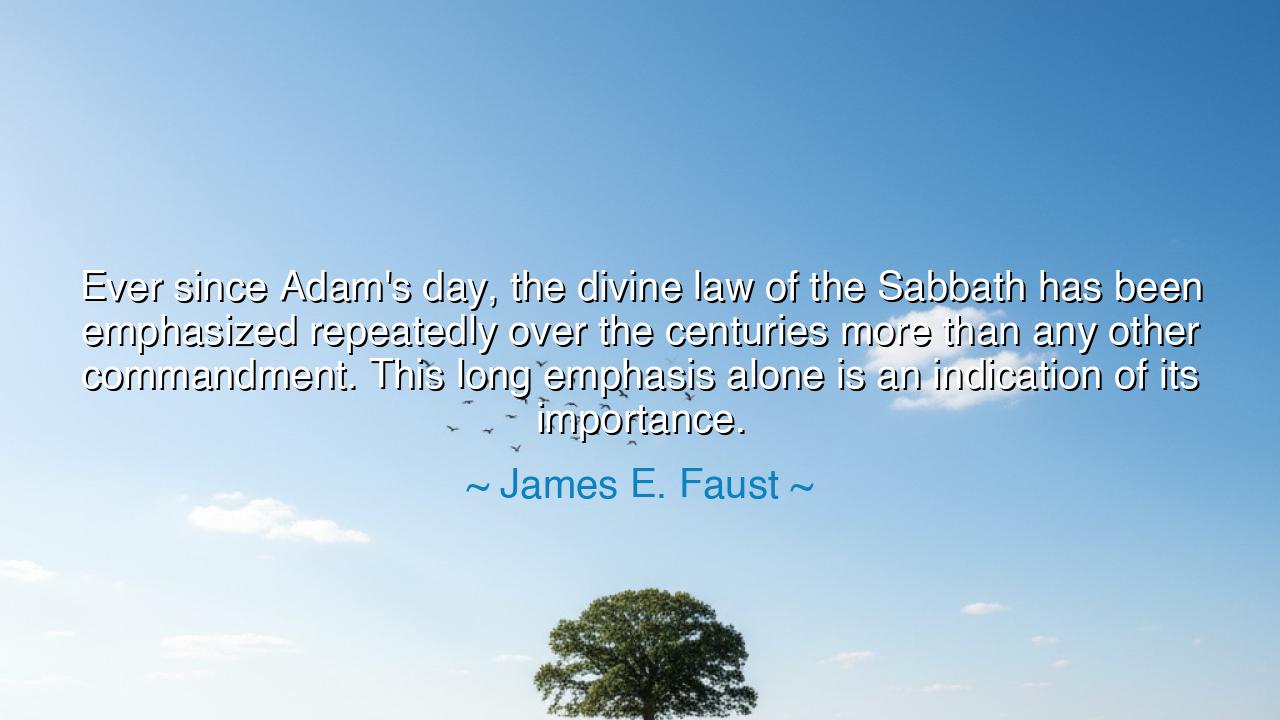
Ever since Adam's day, the divine law of the Sabbath has been
Ever since Adam's day, the divine law of the Sabbath has been emphasized repeatedly over the centuries more than any other commandment. This long emphasis alone is an indication of its importance.






“Ever since Adam’s day, the divine law of the Sabbath has been emphasized repeatedly over the centuries more than any other commandment. This long emphasis alone is an indication of its importance.” — James E. Faust
In these solemn and reverent words, James E. Faust, a man of faith and wisdom, speaks of one of the oldest and most sacred principles known to humanity — the Sabbath, the day of rest sanctified by God Himself. He reminds us that from the dawn of creation, when Adam first breathed the air of Eden, this commandment has stood as a pillar of divine law, repeated and reaffirmed through all generations. “Ever since Adam’s day,” he says, the Sabbath has been emphasized repeatedly, not because men are forgetful of it by chance, but because it lies at the very heart of humanity’s relationship with the Divine. The constancy of this command — echoing through prophets, priests, and apostles — testifies to its eternal significance.
The origin of this quote lies in Faust’s deep belief in the sacred pattern established by God in Genesis: “And on the seventh day, God ended His work which He had made; and He rested.” Here, in the stillness after creation, the Lord set an example for all humankind — that rest is not idleness, but holiness, a time to renew the body and awaken the soul. Through the centuries, as nations rose and fell, the Sabbath remained a sign between God and His people, a covenant of remembrance. When Faust declared that the Sabbath has been “emphasized more than any other commandment,” he spoke not of tradition but of divine persistence — the Almighty’s insistence that man must pause amid his labors to remember his Maker.
This truth has been echoed by the voices of prophets and sages. In Moses’ day, the commandment to “remember the Sabbath day, to keep it holy” was not buried among the minor laws of the Israelites; it stood among the Ten Commandments, written by the finger of God upon stone. When Isaiah foretold blessings, he promised that those who honored the Sabbath would “ride upon the high places of the earth.” And in the time of Christ, when men had turned rest into ritual, the Savior Himself restored its meaning: “The Sabbath was made for man, and not man for the Sabbath.” Through every age, the Lord has had to call His children back to this truth — that rest, worship, and reflection are not luxuries, but necessities for the soul.
Faust’s words also speak to a deeper struggle of the modern age. In a world that glorifies busyness, where man is chained to his devices and his days blur into endless toil, the Sabbath stands as an act of defiance — a holy rebellion against the tyranny of time. To cease from labor for one day is to declare that life is more than productivity, that the soul is greater than the schedule. In honoring the Sabbath, man reclaims his divine heritage — he steps out of the noise of creation to commune with its Creator. This rhythm of work and rest is not merely a command; it is a gift, a divine pattern meant to restore harmony between flesh and spirit.
Consider the story of Eric Liddell, the Scottish runner whose faith inspired the film Chariots of Fire. In 1924, he refused to compete in the Olympic heats held on Sunday, choosing instead to honor the Sabbath. Many mocked him, and his decision cost him what the world saw as glory. Yet his conscience stood firm. Later, he ran another race, not his own specialty, and won gold — not only in sport, but in faith. His example lives on as a witness that obedience to divine law, even when it defies worldly expectation, brings peace that surpasses any earthly reward. In this, he embodied Faust’s truth: the Sabbath’s importance lies not only in its command but in the transformation it brings to those who keep it.
The divine law of the Sabbath is thus more than ritual; it is a refuge. It invites the weary to find strength, the distracted to find clarity, and the lost to remember their source. In the ancient pattern of resting one day in seven, God offers His children a rhythm that mirrors the heartbeat of eternity — creation, rest, renewal. It is the pause between the notes that gives music its soul; so too is the Sabbath the pause that gives meaning to life.
So, O listener, take this counsel from James E. Faust as both wisdom and warning: do not let the sacred day be swallowed by the noise of the world. Set aside your burdens, your ambitions, your devices, and enter the stillness that was blessed from the beginning. Use the Sabbath not for idleness, but for reverence, not for escape, but for connection. Remember your Creator, nourish your spirit, and let your rest become worship. For as Faust teaches, the very endurance of this commandment through all ages is a sign of its divine weight — a reminder that while the world changes, the soul’s need for rest in God remains eternal.






AAdministratorAdministrator
Welcome, honored guests. Please leave a comment, we will respond soon